Different Perspectives of the Foster Care System
I recently conducted a survey looking at the different perspectives of the foster care system. I was blown away by how drastically different the perspectives were.
Authors of Systems Thinking Made Simple: New Hope for Solving Wicked Problems Derek and Laura Cabrera provide us a great way to look at perspectives. They inform us that different perspectives result from changing the Point, the View, or Both. By understanding multiple perspectives, we can change our perspectives. Let’s examine how the Cabreras use perspectives:
- Perspectives are made up of two related elements: a Point from which we are viewing and the thing or things that are in View (Point-of-View). In my survey, the individual (i.e. social worker) was the Point, where the View is the foster care system.
- Being aware of the perspectives we take and do not take is paramount to deeply understanding ourselves and the world around us. This is an important point. For example, the biological parent can improve their understanding of a situation by understanding the perspective of a foster parent.
Using the Cabrera’s phenomenal system on kingfisher.link, I was able to capture the results of my survey and demonstrate the vastly different perspectives. Let’s take a look.
Perceptions of the Foster Care System – Survey
“Sometimes perspectives are so basic and so unconscious to us, we are unaware of them but they are always aware of us.” – Derek and Laura Cabrera
So far, I have collected 243 responses to my survey on the perceptions of the foster care system. The survey is still active – feel free to complete it here.
The survey consisted of the following 10 questions:
1. Who are you? There were multiple options (only one could be selected – this is where I was able to identify each stakeholder).
2. From your perspective, what do you feel the role and mission of the foster care system should be?
3. From your perspective, do you feel as though the foster care system is working? Please explain why or why not.
4. From your perspective, what are the strengths of the foster care system?
5. From your perspective, what are the major challenges in the foster care system?
6. From your perspective, what misconceptions do people have about the foster care system?
7. If you had a magic wand and were in charge of the foster care system, what would you do?
8. From your perspective, what changes and/or improvements would you make in the foster care system (both short-term and long-term)?
9. What approaches from other systems and/or fields would (or might) work in foster care?
10. In its current state, is the foster care system working? (definition of working = does it do what is in the best interest of the child?)
The following stakeholders responded to the survey (the survey was/is anonymous):
- Social Worker
- Child Protective Services (CPS) or Department for Children and Families (DCF) Employee
- Biological Parent (child removed from your home)
- Foster Parent (including former)
- Foster Child (including former)
- Education Professional
- Politician
- Volunteer Advocate (i.e. CASA)
- Grandparent
- Adoptive Family
- Law Enforcement
- Contractor (if system is privatized)
- General Population (no affiliation with foster care)
I chose four specific stakeholders and wanted to find out how they perceive four different points of view within foster care: the role of foster care, challenges within foster care, misconceptions in foster care, and improvement ideas in foster care.
Let’s take a look at the different perspectives.
Different Perspectives: Role of Foster Care
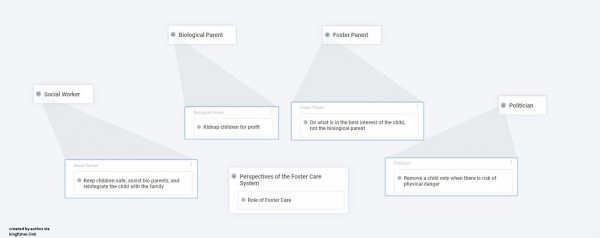
Key insights:
- Biological parents see foster care as a way to kidnap children, where the foster parent views the system as a way to remove a child from a harmful biological family.
- A politician views the system as necessary only if a child is in physical danger.
Different Perspectives: Challenges in Foster Care
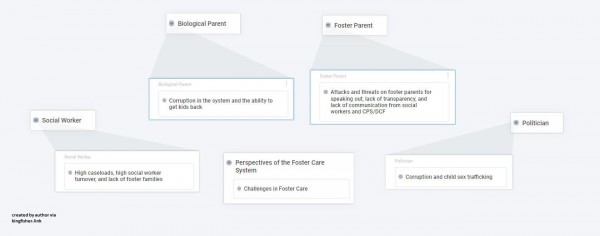
Key insights:
- Each stakeholder (minus the social worker) perceives significant corruption within the system.
- The biological parent perceives corruption in keeping children away from them; the foster parent perceives the system is withholding their rights; the politician views major challenges in the system as corruption and sex trafficking.
Different Perspectives: Misconceptions in Foster Care
The perspectives here provide an idea of the misconceptions in foster care (from the point – individual – and the view – foster care system). A misconception is a view that is incorrect because it is based on faulty thinking.
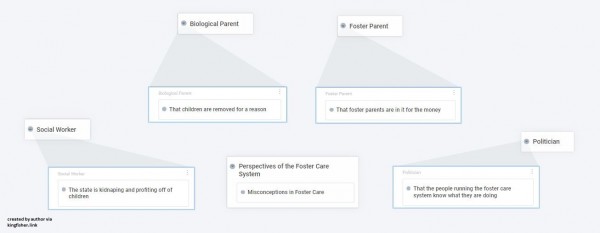
Key insights:
- Each stakeholder has a drastically different perspective on the errors in which others think about the system.
- For example, the politician thinks that an incorrect view held by the general population is that the people running foster care actually know what they are doing, where a foster parent feels that people think they are just in it for the money.
Different Perspectives: Improvement Ideas in Foster Care
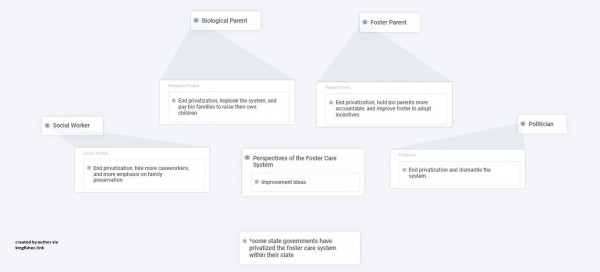
The Cabreras inform us that a perspective can also be a lens through which we look at some other idea and that lens can be a thing, an event, a person, a place, and even an idea. With questions 7, 8, and 9 in my survey, I sought to uncover ideas for improvement in the foster care system from specific perspectives.
Key insights:
- Some state governments have privatized the foster care system within their state. Ending privatization was the one thing that just about every stakeholder agreed on. They all nearly had the same perspective on that one idea.
- Foster parents think improvements can come by way of additional adoption incentives and holding biological parents more accountable, where biological parents think incentives to raise their own children should be centered around them.
- Social workers think there needs to be more caseworkers, where politicians think the system needs to be dismantled.
Perspectives: All Stakeholders
Let’s now take a look at the different perspectives from all the stakeholders.
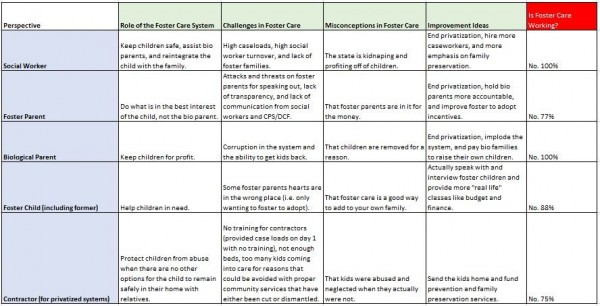
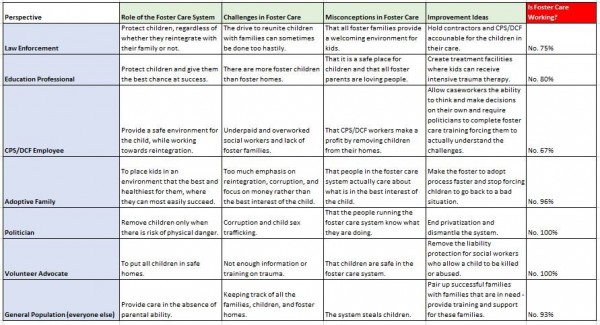
- Notice the last question on each image – Is Foster Care Working? This was another perspective each group agreed upon. The majority said No.
- An alarming issue was discovered by the contractor group. The perspective under Challenges in Foster Care – No training for contractors (provided case loads on day 1 with no training).
- An intriguing idea was brought up by the General Population under Improvement Ideas – Pair up successful families with families that are in need. Provide training and support for these families.
Intriguing Remarks!
Lastly, let’s take a look at some perspectives in the survey that were intriguing and some that were completely crazy!
Intriguing/helpful perspectives:
- Create treatment facilities, both inpatient and intensive outpatient, where all kids can receive intensive therapy with experienced trauma informed professionals.
- Provide one-on-one support to the child and stop allowing people who know the system the ability to work the system.
- Provide parents funding to obtain a skill and one-on-one support for biological parents. Provide them weekly therapy in a neutral environment focusing on strengthening the family.
- Have a chain of communication that broadcasts current children to foster families. Have a chain of communication to meet current needs such as formula and clothing.
- Foster care needs to be presented as a community issue, not just a government/state issue. Understanding that it involves community organizations, churches, neighborhoods, and families.
- Neurobiology training to educate providers on the impacts of trauma.
- College-type dorm for older and responsible children in foster care.
- Anything that involves foster parents and birth parents working closely together. Stop the “us versus them” mindset.
Less helpful perspectives (please note that these are NOT the ideas of the author!):
- If a parent loses a child because of their poor choices, they should no longer be able to have a child. We have the technology.
- Institute a “2 strikes and you’re out” for removals. Causing repeat offenders (multiple children in the system) to take sterilization for money or tax credit.
- Help families financially until their children are 18. Pay for a maid if the house has to be clean, transportation services (repair vehicle, vouchers for bus or cabs). Pay for a relative to be able to help with daily living skills.
- Fire every feminist and demand accountability on every level.
- Fire all caseworkers and replace them all with nurses.
- Advocate for homeopathic methods; i.e. Reiki, essential oil therapy, prayer/spirituality to help release negative emotions








